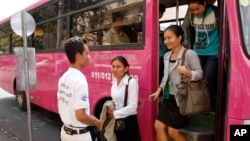After a bright kick off in early February, Phnom Penh’ city bus service has now enjoyed some progress, with a steady increase in passengers.
However, it remains to be seen whether many Cambodians will switch from motorcycle taxis to the bus, and many seats remain empty.
After failing to reach official agreement with the Chinese company Global Trade Development a few months ago, Phnom Penh and the department of public transportation are working to continue running the city bus.
Ten buses are still available for passengers living along Monivong Blvd, City Hall spokesman Long Dimanche told VOA Khmer Thursday.
Around 1,300 people ride the bus each day, he said. “People show us their satisfactions and support,” he said. “They want us to expand more bus lines to other locations, and we believe the expansion will increase customers.”
The city has ordered 40 buses from South Korea, which will arrive soon, he said. “We will expand bus running lines to be longer, as well as bus routes to other main streets in Phnom Penh.”
The bus system does have loyal users, like Vy Rorng, a 22-year-old garment factory worker. “More people now choose to ride the public bus, I can see that,” he said. “Although the bus is not full, there are a lot of people.”
Nearby passenger Sok Khoun, who wore a military uniform, said he chose the bus over his motorcycle, because the bus was safer and more convenient.
“I ride it several times a week to my workplace,” he said. “Sometimes there are a lot of people.”
The Monivong line has 36 stops, with waits of between 10 to 15 minutes between pick-ups. The service starts early in the morning and ends at 8:30 pm, charging passengers 1,500 riel per ticket.
Driver Chheang Chantho said each bus will see about 100 passengers a day and are busiest between 8 am and 6 pm.
“Most customers are public officials,” he said. “For business people, they don’t want to ride public buses.”
The buses are getting more popular, he said.
Still, many seats remain empty, perhaps as many as half of the 25 seats, said one staff member, who asked not to be named. And they probably aren’t profitable, she said.
Still, Long Dimanch said the city will continue to offer the service. “We expect to proceed with our plan when the new buses come.”






